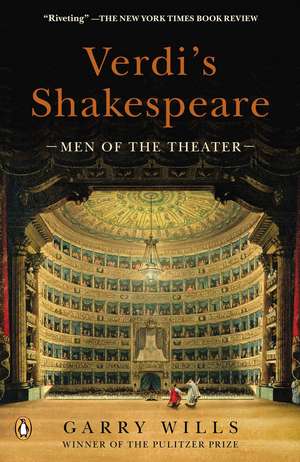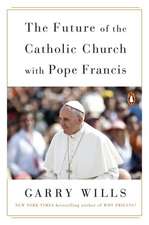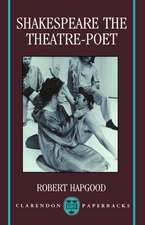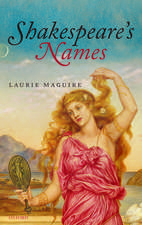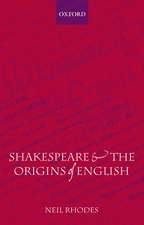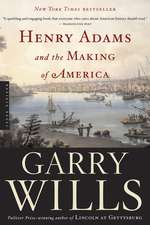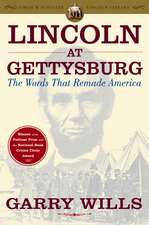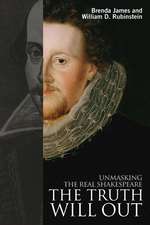Verdi's Shakespeare: Men of the Theater
Autor Garry Willsen Limba Engleză Paperback – 26 noi 2012 – vârsta de la 18 ani
"Riveting . . . a double-barreled salvo that hits two bull's-eyes." —The New York Times Book Review
This dazzling study of the three operas that Giuseppe Verdi adapted from Shakespeare's plays takes readers on a wonderfully engaging journey through opera, music, literature, history, and the nature of genius. Verdi's Shakespeare explores the writing and staging of Macbetto (Macbeth), Otello (Othello), and Falstaff, operas by Verdi, an Italian composer who could not read a word of English but who adored Shakespeare. Delving into the fast-paced worlds of these men and the hands-on life of the stage that at once challenged them and gave flight to their brilliance, Wills, in his inimitable way, illuminates the birth of artistic creation.
This dazzling study of the three operas that Giuseppe Verdi adapted from Shakespeare's plays takes readers on a wonderfully engaging journey through opera, music, literature, history, and the nature of genius. Verdi's Shakespeare explores the writing and staging of Macbetto (Macbeth), Otello (Othello), and Falstaff, operas by Verdi, an Italian composer who could not read a word of English but who adored Shakespeare. Delving into the fast-paced worlds of these men and the hands-on life of the stage that at once challenged them and gave flight to their brilliance, Wills, in his inimitable way, illuminates the birth of artistic creation.
Preț: 129.65 lei
Nou
Puncte Express: 194
Preț estimativ în valută:
24.82€ • 26.97$ • 20.86£
24.82€ • 26.97$ • 20.86£
Carte disponibilă
Livrare economică 01-15 aprilie
Preluare comenzi: 021 569.72.76
Specificații
ISBN-13: 9780143122227
ISBN-10: 0143122223
Pagini: 225
Dimensiuni: 127 x 196 x 18 mm
Greutate: 0.18 kg
Editura: Penguin Books
ISBN-10: 0143122223
Pagini: 225
Dimensiuni: 127 x 196 x 18 mm
Greutate: 0.18 kg
Editura: Penguin Books
Recenzii
Normal 0 false false false MicrosoftInternetExplorer4 st1\:*{behavior:url(#ieooui) } /* Style Definitions */ table.MsoNormalTable {mso-style-name:"Table Normal"; mso-tstyle-rowband-size:0; mso-tstyle-colband-size:0; mso-style-noshow:yes; mso-style-parent:""; mso-padding-alt:0in 5.4pt 0in 5.4pt; mso-para-margin:0in; mso-para-margin-bottom:.0001pt; mso-pagination:widow-orphan; font-size:10.0pt; font-family:"Times New Roman"; mso-ansi-language:#0400; mso-fareast-language:#0400; mso-bidi-language:#0400;} A Booklist Editor’s Choice Pick for 2011
“Wonderfully illuminating. This book is the product of a lifetime of listening and watching….No lover of Verdi—or Shakespeare, for that matter—will want to miss it.”
—Opera News
“Riveting…a double-barreled salvo that hits two bull’s-eyes. Shakespeare scholarship is one of the world’s thriving industries, with no factories but worldwide workshops. While you are reading this, there must be hundreds (thousands?) of worthies turning out articles and books from pole to pole. But Garry Wills has upped the ante. There is a fair, but not daunting, amount of musical analysis, as well as much acknowledged borrowing and quoting from other relevant writers. This only makes the book more useful, what with burrowings (rather than borrowings) a worm would be proud of, and a panorama worthy of a fly’s multifaceted eye. “Nomen est omen” goes a Latin adage: the name is a signifier. So the noun “Wills” suggests manifold motivation, multiple resolve. Whatever Garry undertakes, trust Wills to get done.”
—John Simon, The New York Times
“Wills’s joyously engaged, scholarly yet personable essay is not just a treat but also a banquet succulent enough to make Shakespeareans and Verdians of all who partake of it.”
—Booklist, starred review
“Opera aficionados will delight in Wills’s thoughtful, deeply rehearsed essays. . . . [His] detailed depictions of the operas’ subtleties, sublimely rendered for opera fans, endlessly elucidate the work of these ‘creative volcanoes.’”
—Publishers Weekly
“Wills brilliantly explores the evolution, development, and performance histories of the three plays (actually, four, counting both Henry IV and Merry Wives of Windsor as inspirations for Falstaff), the three operas, and the connections among them. As essential purchase. ”
—Library Journal, starred review
“Wills’s insights into both Verdi’s acute understanding of Shakespeare and his ingenious methods of conveying it are thrilling—particularly his account of how, when composing “Otello,” Verdi encapsulated the six hundred and eighty-six lines of the play’s first act within a few minutes of music.”
—The New Yorker
“Fascinating.”
—Commonweal Magazine
“One genius interprets another: English to Italian, words to lyrics, immortal drama to overpowering opera. . . . While the book has an enormous amount to teach devotees of either Shakespeare or Verdi, opera fans in particular will enjoy the author’s close and illuminating attention to backstage history, as well as words, music and phrasing.”
—Kirkus
“A labor of love.”
—HistoryWire.com
“Despite the novelty of the subject in VERDI'S SHAKESPEARE, Wills’s writing is characteristically clear and marked with literate ping. . . . Throughout, he demonstrates an innate understanding of drama and music and how they can work together. His analysis of melody, harmony and orchestration are as solid as his examination of theatrical practice and technique. And his research is thorough. He draws on the considerable store of data unearthed by others, citing in his more than one hundred footnotes a veritable Who’s Who of opera and theater scholars.”
—The Washington Independent Review of Books
“Wonderfully illuminating. This book is the product of a lifetime of listening and watching….No lover of Verdi—or Shakespeare, for that matter—will want to miss it.”
—Opera News
“Riveting…a double-barreled salvo that hits two bull’s-eyes. Shakespeare scholarship is one of the world’s thriving industries, with no factories but worldwide workshops. While you are reading this, there must be hundreds (thousands?) of worthies turning out articles and books from pole to pole. But Garry Wills has upped the ante. There is a fair, but not daunting, amount of musical analysis, as well as much acknowledged borrowing and quoting from other relevant writers. This only makes the book more useful, what with burrowings (rather than borrowings) a worm would be proud of, and a panorama worthy of a fly’s multifaceted eye. “Nomen est omen” goes a Latin adage: the name is a signifier. So the noun “Wills” suggests manifold motivation, multiple resolve. Whatever Garry undertakes, trust Wills to get done.”
—John Simon, The New York Times
“Wills’s joyously engaged, scholarly yet personable essay is not just a treat but also a banquet succulent enough to make Shakespeareans and Verdians of all who partake of it.”
—Booklist, starred review
“Opera aficionados will delight in Wills’s thoughtful, deeply rehearsed essays. . . . [His] detailed depictions of the operas’ subtleties, sublimely rendered for opera fans, endlessly elucidate the work of these ‘creative volcanoes.’”
—Publishers Weekly
“Wills brilliantly explores the evolution, development, and performance histories of the three plays (actually, four, counting both Henry IV and Merry Wives of Windsor as inspirations for Falstaff), the three operas, and the connections among them. As essential purchase. ”
—Library Journal, starred review
“Wills’s insights into both Verdi’s acute understanding of Shakespeare and his ingenious methods of conveying it are thrilling—particularly his account of how, when composing “Otello,” Verdi encapsulated the six hundred and eighty-six lines of the play’s first act within a few minutes of music.”
—The New Yorker
“Fascinating.”
—Commonweal Magazine
“One genius interprets another: English to Italian, words to lyrics, immortal drama to overpowering opera. . . . While the book has an enormous amount to teach devotees of either Shakespeare or Verdi, opera fans in particular will enjoy the author’s close and illuminating attention to backstage history, as well as words, music and phrasing.”
—Kirkus
“A labor of love.”
—HistoryWire.com
“Despite the novelty of the subject in VERDI'S SHAKESPEARE, Wills’s writing is characteristically clear and marked with literate ping. . . . Throughout, he demonstrates an innate understanding of drama and music and how they can work together. His analysis of melody, harmony and orchestration are as solid as his examination of theatrical practice and technique. And his research is thorough. He draws on the considerable store of data unearthed by others, citing in his more than one hundred footnotes a veritable Who’s Who of opera and theater scholars.”
—The Washington Independent Review of Books
Notă biografică
Garry Wills is one of the most respected writers on religion today. He is the author of Saint Augustine’s Childhood, Saint Augustine’s Memory, and Saint Augustine’s Sin, as well as the Penguin Lives biography Saint Augustine. His other books include “Negro President”: Jefferson and the Slave Power, Why I Am a Catholic, Papal Sin, and Lincoln at Gettysburg, which won the Pulitzer Prize.
Descriere
Pulitzer Prize winner and lifelong opera devotee Wills explores the writing and staging of Verdi's three triumphant Shakespearian operas: "Macbeth, Othello," and "Falstaff." Wills delves into the fast-paced worlds of these men of the theater, focusing on the intense working relationships both Shakespeare and Verdi had with the performers and producers of their works.
